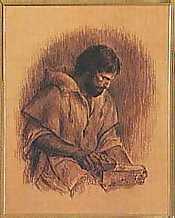Heading off to the costume party
It was costume party day at my children’s
playgroup. Our eldest son, four
years old at the time, had decided to be a carpenter. To create his costume, we had dug
into my old blue trunk. That trunk had been to university and back with me, but
now served the very useful purpose of storing items for ‘dress-up’ play.
We fashioned a simple costume. My
son wore a carpenter’s apron and toted a hand crafted wooden toolbox with
miniature tools. On his head was an orange plastic Tonka hard hat. We left our home pleased with his
appearance, and headed off confidently to enjoy the party.
My heart sunk when we entered the
room; my son's peers were spectacularly and elaborately decked out. Little
boys, dressed as dinosaurs and dragons, and little girls, dressed as princesses
and fairies, appeared to have sprung fully costumed from the pages of a pop-out
storybook.
Fortunately, my son was oblivious to the inadequacy of his tickle
trunk costume. The children crowded around him, drawn to the costume with its miniature
tools.
At some level, the children
sensed that here was the genuine article, a costume that expressed character. Here
was a kid who had helped create his character. In creating the costume, he had
become a carpenter. There was nothing remarkable about his costume, but there
was integrity in the character.
Learning from a simple carpenter
 |
| "The Carpenter" by Frances Hook |
In the 1st century, in
Palestine, a simple carpenter, named Jesus, appeared on the scene. He came from
an obscure village and an ordinary family. Based on his position in society,
there was nothing to recommend him to others. “He had no form or majesty that
we should look at him, nothing in his appearance that we should desire him”
(Isaiah 53:2). Yet, he taught and spoke with authority; crowds hounded him, and
the religious leaders feared him.
Jesus had charisma. His
character, not his costume, attracted people. His charisma came from his sense
of identity as God’s beloved. His self-esteem was rooted in being loved and in
loving others. Love informed his words and deeds.
Jesus knew that the people of his
time were impressed with good looks, fine clothes, and lavish homes. People
viewed these outward externals of success as a reward from God for being good.
So Jesus warned his disciples of the deceptive nature of outward appearances. Referring
to the scribes, Jesus noted that this group of men liked to parade in long
robes and to be greeted obsequiously. They said long prayers “for the sake of
appearance” but their hearts were hardened towards the poor and suffering (Mark
12:38-40).
Cars, homes and clothes may become our costumes
We are not very different from
the people of Jesus’s time. We are impressed with appearances. Popular culture
bombards us with images of narcissism. The advertising, fashion, and entertainment
industries entice us to costume ourselves in imitation of the wealthy and
glamorous. Our cars, homes, and clothes may become our costumes; they
may project an image not of who we are, but of who we want to be. We let
the externals create our character.
The external things are like
spectacular costumes worn to the party. They may be masks that conceal our
sense of inadequacy or our feelings of exclusion. Our costumes may be glorious
to look upon while our character is bruised or lacking in substance.
Peeling back the costume
Meister
Eckhart, a medieval mystic, spoke about the spirituality of detachment. This is
the stripping away of possessions, attitudes and sometimes relationships until
we have nothing. In nothingness, we discover who we truly are, and we become
one with God.
Jesus invited all people to
discover the worth of their person. The spiritual life invites us to shed the
layers of our costumes and to peel back the mask that conceals our true self.
To do so is to undertake the risky journey of discovering the genuine article
of our being.



No comments:
Post a Comment